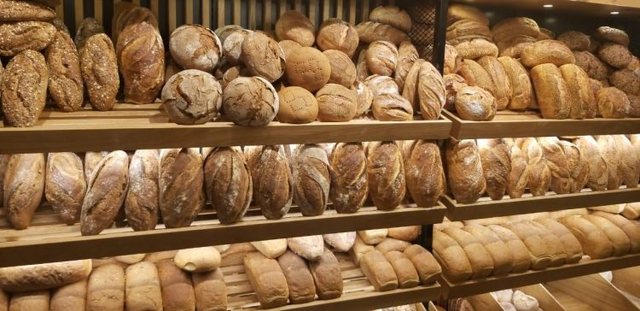
 Flash News
Flash News
The prosecution sends 5 Kosovar citizens to trial for drug smuggling
21-year-old injured with knife in Saranda
Gunfire in Kavaja, shot at a married couple
Interventions in Spaç prison, Ministry of Culture reacts: We do not intend to modify history
Accident on the new Kukes bridge, three vehicles collide

Many people avoid bread, but choosing the right kind can have positive effects on your gut. Also, conversely, choosing the wrong type can cause side effects.
With the right choice of bread, its consumption can have five positive effects on your intestines:
It can improve gut health
"100 percent whole grain bread can improve gut health because the soluble fiber found in some grains ferments the good bacteria in the gut to produce fatty acids," explains nutritionist Lauren Harris-Pincus.
These fatty acids are the gold standard fuel for colon cells and can improve the intestinal barrier, reduce inflammation, and reduce the risk of colon cancer - writes Eat This, Not That!.
It can strengthen the immune system
Several studies have been conducted to examine how gut microbes respond to the consumption of whole grains, including 100 percent whole grain bread. Eating whole grains can benefit the bacterial profile in your gut.
Several studies have shown that grains, including 100 percent whole grain bread, increase the amount of microbes called bifidobacteria and lactobacilli. When the amount of these microbes increases, it is associated with improved immune system function – just like the 30 Best Foods to Boost the Immune System.
You feel satisfied
There is evidence that eating whole grains, such as 100 percent rye bread and whole wheat bread, can affect gut bacteria and lead to feelings of fullness.
The research pointed more towards oats, barley and rye – which can be found in some whole grain breads. Although more research is needed, including a variety of whole grain breads in your healthy eating plan can help you feel satisfied.
So not only can bread support the health of your gut microbiome, but eating the right kind can keep you full.
It can cause abdominal pain and bloating
"For those with irritable bowel syndrome (IBS), eating certain fermentable carbohydrates found in bread called FODMAPs can cause abdominal pain, bloating, diarrhea or constipation," says Harris-Pincus.
Although people often blame gluten, fructans found in grains that contain gluten, such as wheat, rye or barley, can also cause unwanted effects. Instead, Harris-Pincus recommends trying a variety of gluten-free bread or white sourdough, which is usually better tolerated.
It can cause an imbalance of bacteria in the gut
Eating bread low in whole grains, such as white bread, has been linked to a condition known as gut dysbiosis, meaning it can lead to an imbalance of gut microbes.
This means that the bacteria in your gut are not doing a good job of keeping your gut healthy. Alternatively, you may be able to support the growth of beneficial bacteria by adding fermented foods to your diet.
Latest news


How did the feud between Donald Trump and Elon Musk start?
2025-06-06 11:52:32
The prosecution sends 5 Kosovar citizens to trial for drug smuggling
2025-06-06 11:33:56
21-year-old injured with knife in Saranda
2025-06-06 11:24:10
Kosovo citizens flock to the Albanian coast, long queue from Morina
2025-06-06 11:11:07
Gunfire in Kavaja, shot at a married couple
2025-06-06 11:05:01
Merz: Bashkëpunim i ngushtë Gjermani-SHBA
2025-06-06 10:45:35
A marijuana plantation is found in Cakran, a 24-year-old man is arrested
2025-06-06 10:25:53
Gianni De Biasi shows the formula for how we can win against Serbia
2025-06-06 10:08:57
Hoxha: The CEC was one of the main architects of the destruction of free voting
2025-06-06 09:52:16
Foreign exchange, June 6, 2025
2025-06-06 09:33:01


Accident on the new Kukes bridge, three vehicles collide
2025-06-06 08:43:06
Horoscope, what do the stars have in store for you today?
2025-06-06 08:28:14
Clear weather with few clouds, the forecast for this Friday
2025-06-06 08:13:54

Morning Post/ In 2 lines: What mattered yesterday in Albania
2025-06-06 07:46:29
In trial for tender abuse, socialist MP targets ILD
2025-06-05 22:37:09
Tabaku: The left in Albania has shown with facts that it is against integration
2025-06-05 22:09:44

Uzbekistan qualifies for the World Cup for the first time
2025-06-05 21:14:35
Index: Albania among countries that consistently violate workers' rights
2025-06-05 20:53:35
Accident in Burrel, two vehicles collide, 6 injured
2025-06-05 20:31:27
Discover foods that help you relieve stress
2025-06-05 20:16:34
Kalaja: I have a video where votes were taken from the DP and given to the PS
2025-06-05 19:58:04


Berisha: The international community does not accept the farce
2025-06-05 18:57:18
Trump after conversation with Xi: US and China will resume trade talks
2025-06-05 18:35:36
Berisha on May 11: 28 MPs were under the patronage of drug cartels
2025-06-05 18:15:44
The session in the Assembly closes, the majority approves the draft laws alone
2025-06-05 17:55:21
Kurban Bajrami, kreu i Komunitetit Mysliman të Shqipërisë uron besimtarët
2025-06-05 17:29:17

Media at OSCE conference: Organized crime has captured the Albanian state
2025-06-05 16:50:41
Car hits 75-year-old man at white lines in Vlora
2025-06-05 16:42:48

Protest in Spaç, after restoration interventions
2025-06-05 16:27:49
Photo/ Concrete mixer falls into abyss in Ulëz, driver rushed to hospital
2025-06-05 16:15:15
May 11/ Këlliçi: There are attempts to influence the final OSCE-ODIHR report
2025-06-05 16:06:38
Immigration is emptying schools and universities
2025-06-05 15:53:38
Plague breaks out, Kosovo bans import of sheep and goats from Shkodra and Kukësi
2025-06-05 15:48:23
After Tirana, KAS also decides to open the ballot boxes in Dibër
2025-06-05 15:31:03
Tirana is "paralyzed" again, here are the roads that will be blocked tomorrow
2025-06-05 15:20:12



Serbia is coming to Albania tomorrow, here's where it will be accommodated
2025-06-05 14:24:43
US Embassy updates visa appointment system: More flexibility for applicants
2025-06-05 14:21:01

Drug trafficking with "tentacles" in Europe, GJKKO seals prison for 9 arrested
2025-06-05 13:39:35
Deserting from the socialist ranks, Erion Braçe "becomes" a Democrat
2025-06-05 13:23:49
May 11 elections, KAS decides on a full recount of votes in Tirana
2025-06-05 13:22:28

Clashes in the Parliament/ Elisa Spiropali expels Flamur Noka from the session
2025-06-05 13:04:42
A Girl, Otherwise, A Boy
2025-06-05 12:57:30
Accident at the "Albchrome" factory in Elbasan, three people arrested
2025-06-05 12:54:40


Berisha: The law of farce is that the dictator's votes are always increasing
2025-06-05 12:19:16


The murder saga, Alibej: It started after I gave Talo Çela's location
2025-06-05 11:45:27

Muslims celebrate Eid al-Adha, KMSH announces where prayers will be held
2025-06-05 11:24:50
Bardhi: The EU delegation said that crime controlled the elections in Elbasan!
2025-06-05 11:16:51


Journalists were censored by Spiropali, AGSH: Fraud and institutional propaganda
2025-06-05 11:00:20
Noka-majority: The foundations of your power rest on the bought vote
2025-06-05 10:54:00
Analysis: Peace between Russia and Ukraine, further away than it seemed
2025-06-05 10:51:57

Serious in Austria/ 35-year-old Albanian dies at work
2025-06-05 10:21:00

They produced and sold cannabis, 2 brothers arrested
2025-06-05 09:50:30

Guard employee commits suicide with service weapon
2025-06-05 09:15:00
Accident in Fier/ Car collides with an agricultural vehicle, 3 people injured
2025-06-05 09:08:55


Parashikimi i motit për sot
2025-06-05 08:31:59
HOROSCOPE/ Here's what the stars have predicted for each sign
2025-06-05 08:16:17
Morning Post/ In 2 lines: What mattered yesterday in Albania
2025-06-05 07:52:36
Video/ Abin Kurti narrowly escapes, almost falling down the stairs
2025-06-04 22:54:08
The first case of small cattle plague in the country is confirmed
2025-06-04 22:36:54

Blushi: The person who kidnapped Meta became police chief
2025-06-04 21:45:24
"Fraud" with the forgiveness of State Police fines!
2025-06-04 21:15:22



"The real reason why young Albanians like me are coming to the UK illegally"
2025-06-04 20:07:39
Government opens a legal path for investments in Army properties
2025-06-04 19:49:25
Elderly woman forgets stove on, house burns down in Vlora
2025-06-04 19:46:42

Ersekë/ Elderly man struck by lightning, dies on the spot
2025-06-04 19:12:55
Trump calls Putin, warns Ukraine that Russia will respond to attack on airbases
2025-06-04 19:05:56
Zelensky's Chief of Staff Meets with Secretary Rubio in Washington
2025-06-04 18:53:37

